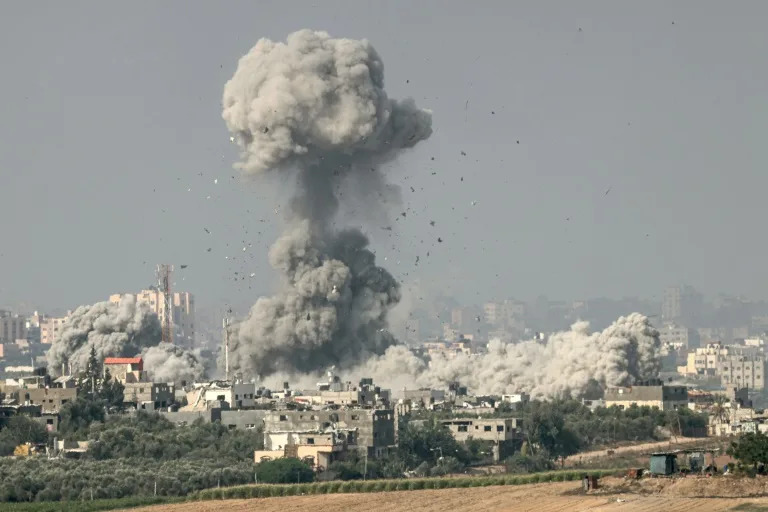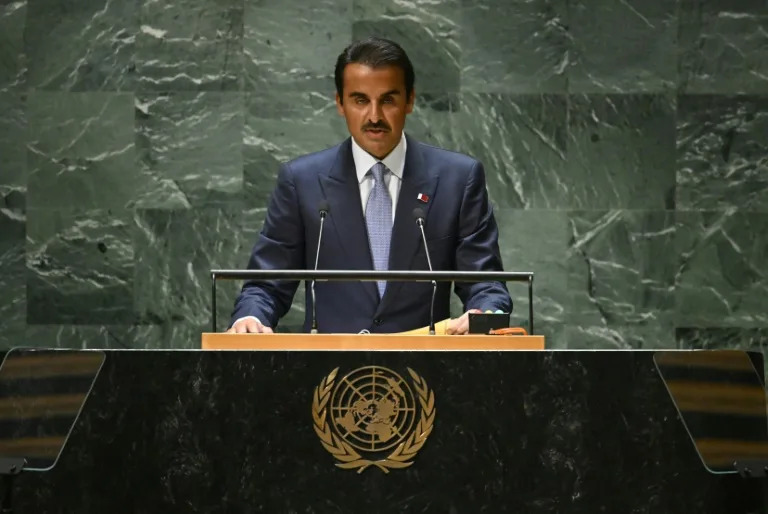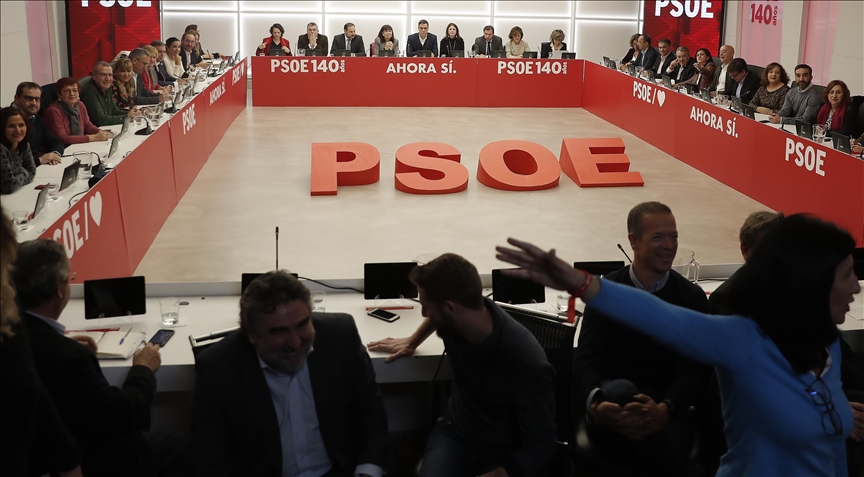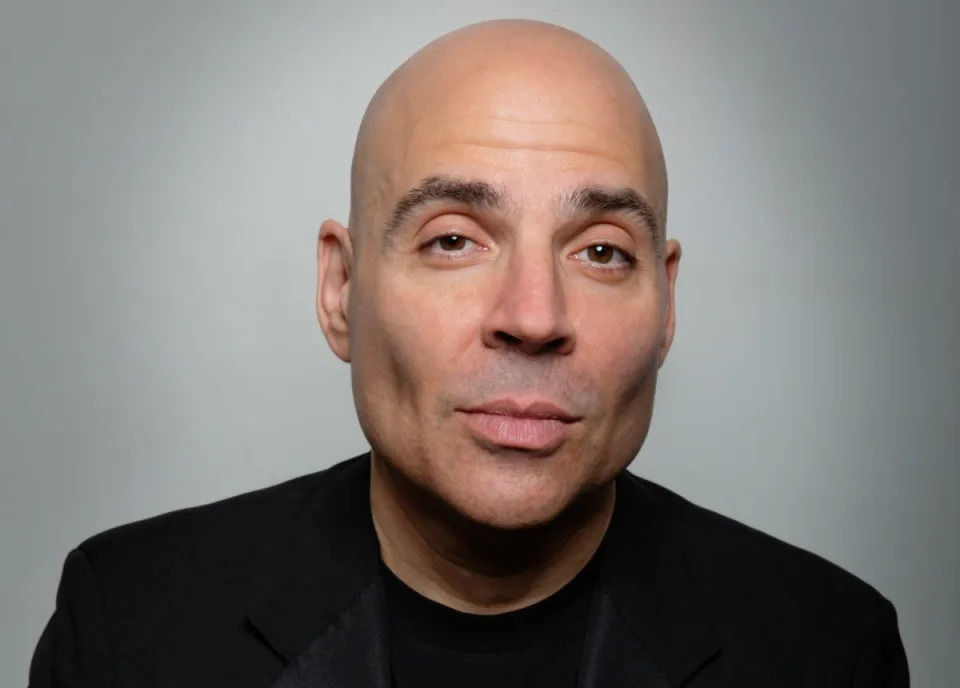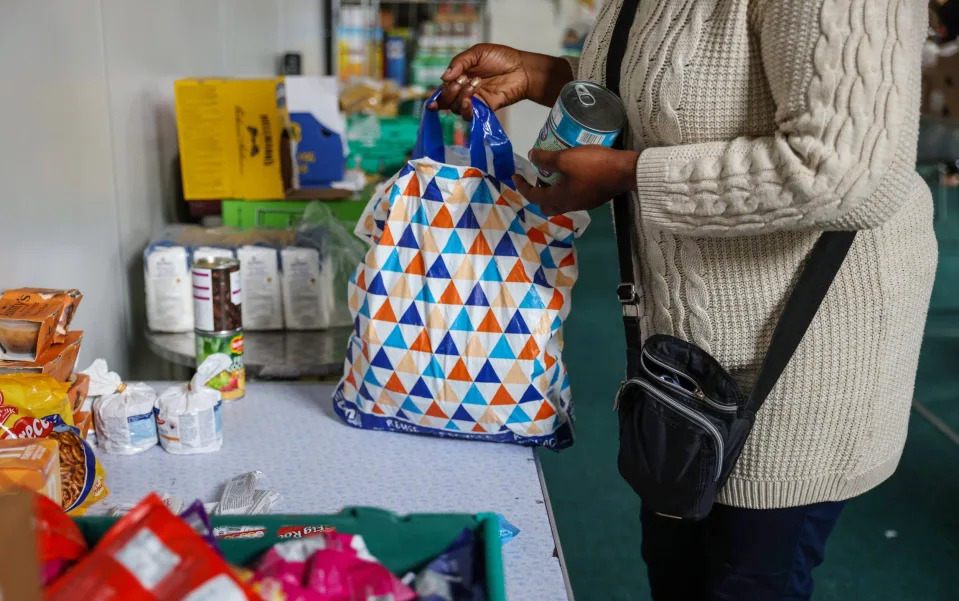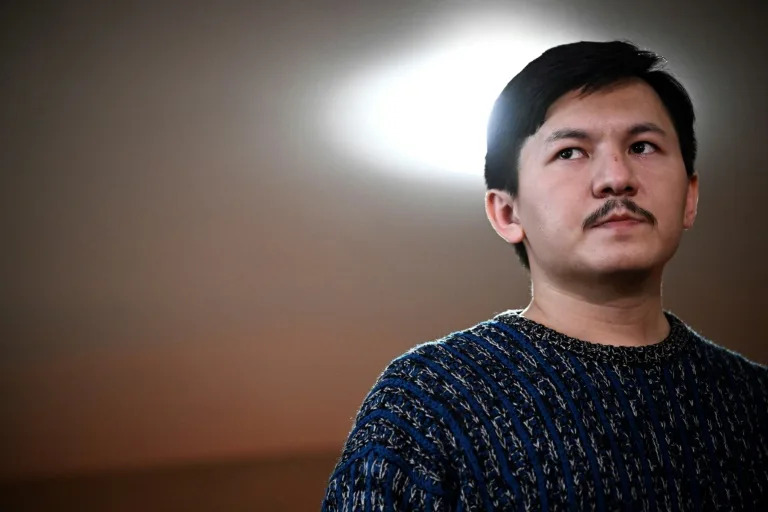Israel-Palestine war: US faith leaders urge immediate ceasefire in congressional 'pray-in'
Widespread backing for a ceasefire among the Democratic base is not represented among Democratic members of US Congress

Faith leaders and activists gather in Rep. Hakeem Jeffries' office for a 'pray-in' on Tuesday
By MEE staff
Published date: 24 October 2023
A group of Muslim, Jewish and Christian faith leaders and activists gathered in House Minority Leader Hakeem Jeffries' office on Tuesday morning in Washington DC, conducting a prayer session and advocating for an immediate ceasefire in Gaza, emphasising it as an ethical decision.
In a poignant gesture, activists held up mirrors inscribed with the words "The world is watching" on the reverse side, with the intention of prompting Congress to confront their potential involvement in Israeli war crimes.
"Every Democrat in Congress who is allowing Israel to carry out mass atrocities in Gaza should know that the world is watching. The only moral choice is ceasefire," Sandra Tamari, the executive director of the Adalah Justice Project, said.
"We will continue disrupting business as usual until Hakeem Jeffries and the Democratic party stops this genocide."
The event began with prayers mourning the thousands of Palestinians who were killed since 7 October. It included payers by Imam Suhaib Webb, Reverend Andre Greene and Rabbi Alissa Wise, along with others.
Stay informed with MEE's newsletters
Sign up to get the latest alerts, insights and analysis, starting with Turkey Unpacked
At least 1,400 Israelis were killed during an unprecedented surprise attack on Israel on 7 October by Hamas and other Palestinian armed groups. Israel says 222 were also taken back to Gaza as captives. Four of them have since been released. Israel responded with a bombing campaign that has taken thousands of Palestinian lives and counting.
At least 5,791 Palestinians have been killed, including 2,360 children and 1,292 women. At least 1,200, including 500 children, are missing and believed to be under rubble.
Religious leaders and advocates underscored the tragic consequences of each explosion and every life lost. They did this by reciting close to 200 names of individuals who were killed due to "American-made weapons".
"Representative Jeffries and fellow progressives should reevaluate their commitment to justice if they continue to oppose a ceasefire in Palestine. Failure to support it undermines their dedication to racial, economic and environmental justice," Webb said.
"History may remember them as the establishment's enablers rather than genuine voices for truth, as allies of plutocracy instead of champions of democracy."
Although there's widespread backing for a ceasefire among the Democratic base, only 18 Democratic representatives have voiced their support by endorsing Rep. Cori Bush's "Ceasefire NOW" resolution presented last week.
At the same time, US President Joe Biden's administration is urging Congress to approve a financial package, proposing $14bn in military aid that would support Israel's military.
"Democratic leadership has failed to stand on the side of what is right. Leadership should be ashamed of its complicity in supporting the genocide of the Palestinian people," Iman Abid, the director of organising and advocacy at the US Campaign for Palestinian Rights, said.
"Their choices are not only against what the majority of Americans are demanding - an immediate ceasefire - but also immoral. We cannot unconditionally fund Israel through this atrocity."
AFP/UNITED NATIONS, UNITED STATES
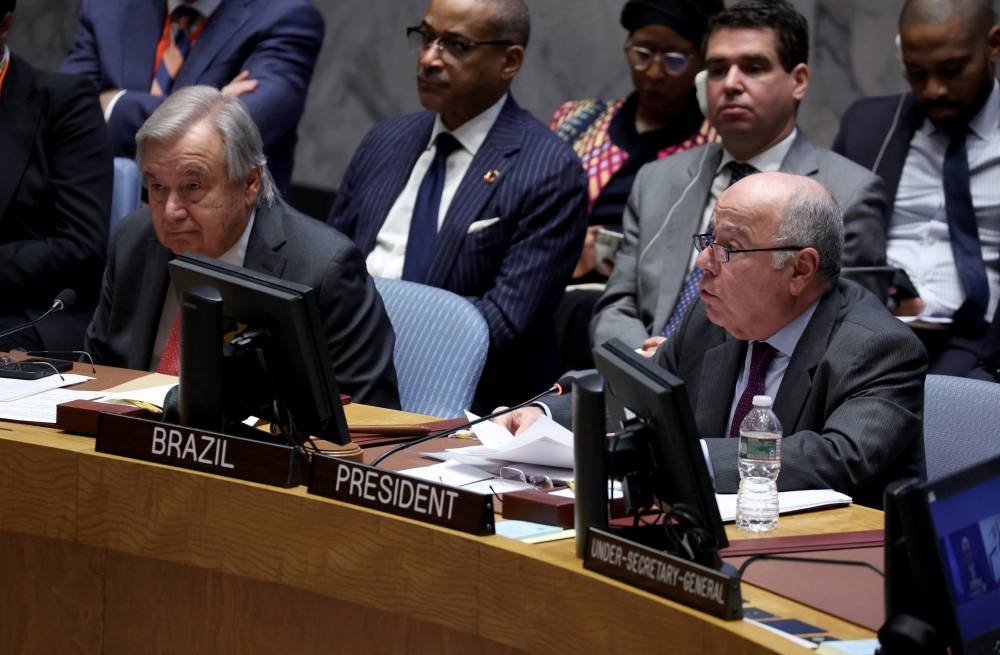
United Nations Secretary-General Antonio Guterres and Brazil's Foreign Minister Mauro Vieira attend a meeting on the conflict between Israel and the Palestinian Islamist group Hamas at UN headquarters in New York, Tuesday. REUTERS
UN Secretary-General Antonio Guterres on Tuesday alleged violations of international law in Gaza and urged an immediate ceasefire as Israel pounds the Palestinian territory, with the crisis deeply dividing the Security Council.
Israel voiced anger over the UN chief's plea before a high-level session of the Security Council, where the Palestinian foreign minister in turn denounced what he described as inaction in the conflict that has killed thousands on both sides, mostly civilians.
Opening the session, Guterres said there was no excuse for the "appalling" violence by Hamas militants on October 7 but also warned against "collective punishment" of the Palestinians.
"I am deeply concerned about the clear violations of international humanitarian law that we are witnessing in Gaza. Let me be clear: No party to an armed conflict is above international humanitarian law," Guterres said, without explicitly naming Israel.
Guterres said that the Palestinians had been "subjected to 56 years of suffocating occupation," telling the Security Council: "It is important to also recognise the attacks by Hamas did not happen in a vacuum."
His remarks infuriated Israeli Foreign Minister Eli Cohen who, pointing his finger at Guterres and raising his voice, recounted graphic accounts of civilians including young children killed on October 7.
"Mr Secretary-General, in what world do you live?" Cohen said.
Rejecting tying the violence to the occupation, Cohen said Israel gave Gaza to the Palestinians "to the last millimeter" with its withdrawal in 2005.
Israel shortly afterward imposed a blockade of the impoverished territory, in place ever since, after Hamas took power, and it still occupies the West Bank.
Israel's ambassador to the United Nations, Gilad Erdan, called on Guterres to resign -- writing on X, formerly known as Twitter.
Guterres, who personally traveled to the crossing between Egypt and Gaza in a push to let in assistance, welcomed the crossing of three aid convoys so far through the Rafah crossing.
But Guterres said it was "a drop of aid in an ocean of need," as the UN agency for Palestinian refugees warned it would be forced to stop working Wednesday due to lack of fuel.
"To ease epic suffering, make the delivery of aid easier and safer, and facilitate the release of hostages, I reiterate my appeal for an immediate humanitarian ceasefire."
Israel, backed by the United States, has rejected calls to halt the offensive, saying it would only allow Hamas to regroup.
The United States last week vetoed a draft resolution on the crisis, saying it did not sufficiently support Israel's right to respond to Hamas.
Secretary of State Antony Blinken asked the Security Council to back a new US-led resolution that "incorporates substantive feedback."
The draft, seen by AFP, would defend the "inherent right of all states" to self-defense while calling for compliance with international law. It would back "humanitarian pauses" to let in aid but not a full ceasefire.
"No member of this council -- no nation in this entire body -- could or would tolerate the slaughter of its people," Blinken said.
Veto-wielding Russia quickly said it would oppose the US draft.
"The main sign that the whole world is expecting from the Security Council is a call for a swift and unconditional ceasefire on the opposing parties. This is precisely what is not in the American draft," said Russia's ambassador, Vassily Nebenzia.
The foreign minister of the Palestinian Authority, run by Hamas rivals, called inaction by the Security Council "inexcusable."
With the Security Council deadlocked, the General Assembly, whose decisions are non-binding, will also take up the crisis Thursday at the request of a number of countries including Jordan and Russia.
Israel rejects calls for ceasefire at major UN meeting and vows to destroy Hamas

Israel has vowed again to destroy Hamas, rejecting calls from the United Nations chief, the Palestinians and many countries at a high-level UN meeting for a ceasefire, and declaring that the war in Gaza is not only its war but “the war of the free world”.
Foreign minister Eli Cohen also dismissed calls for “proportionality” in the country’s response to Hamas’s surprise attacks on Israel on October 7 which killed 1,400 people and has since led to more than 5,700 Palestinian deaths in the Gaza Strip, according to its Health Ministry.
“Tell me, what is a proportionate response for killing of babies, for rape (of) women and burn them, for beheading a child?” he asked. “How can you agree to a ceasefire with someone who swore to kill and destroy your own existence?”
He told the UN Security Council that the proportionate response to the October 7 massacre is “a total destruction to the last one of the Hamas”, calling the extremist group “the new Nazis”.
He added: “It is not only Israel’s right to destroy Hamas. It’s our duty.”
Mr Cohen called the Hamas attacks “a wake-up call for the entire free world” against extremism, and he urged “the civilised world to stand united behind Israel to defeat Hamas”.
He warned that today it is Israel, and tomorrow Hamas and the attackers “will be at everyone’s doorstep”, starting with the West.
Mr Cohen accused Qatar of financing Hamas and said the fate of the more than 200 hostages taken from Israel, some of whose families came to the UN meeting, was in the hands of its emir.
For those actively engaged to avoid an even greater humanitarian catastrophe... it must be clear that this can only be achieved by putting an immediate end to the Israeli warRiyad al-Maliki
Palestinian foreign minister Riyad al-Maliki demanded an end to the Israeli attacks.
“We are here today to stop the killing, to stop… the ongoing massacres being deliberately and systematically and savagely perpetrated by Israel, the occupying power, against the Palestinian civilian population,” he said.
“Over two million Palestinians are on a survival mission every day, every night.”
Under international law, he said, “it is our collective human duty to stop them
Mr al-Maliki warned that more attacks and killings and weapons and alliances will not make Israel safer: “Only peace will.”
“For those actively engaged to avoid an even greater humanitarian catastrophe and regional spillover, it must be clear that this can only be achieved by putting an immediate end to the Israeli war launched against the Palestinian people in the Gaza Strip,” he said. “Stop the bloodshed.”
UN secretary-general Antonio Guterres had opened the monthly meeting on the decades-old Israeli-Palestinian conflict — which has turned into a major event with ministers from the war’s key parties and a dozen other countries flying to New York — warning that “the situation in the Middle East is growing more dire by the hour”.
The UN chief said the risk of the war spreading through the region is increasing as societies splinter and tensions threaten to boil over.
He called for an immediate humanitarian ceasefire to deliver desperately needed food, water, medicine and fuel. He also appealed “to all to pull back from the brink before the violence claims even more lives and spreads even farther”.
Mr Guterres stressed that the rules of war must be obeyed.
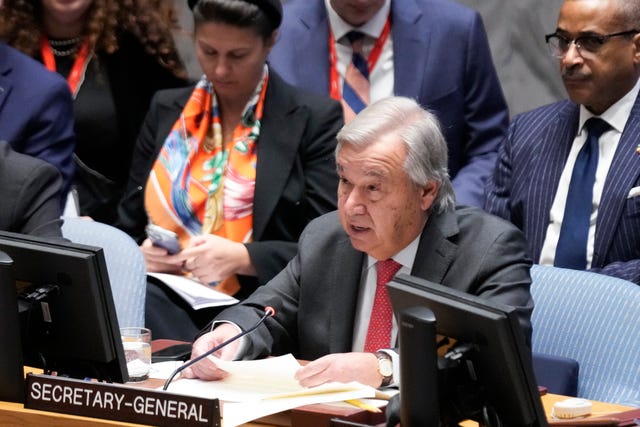
He said the grievances of the Palestinian people cannot justify “the horrifying and unprecedented October 7 acts of terror” by Hamas in Israel and demanded the immediate release of all hostages.
But Mr Guterres also stressed that “those appalling attacks cannot justify the collective punishment of the Palestinian people”.
He expressed deep concern at “the clear violations of international humanitarian law”, calling Israel’s constant bombardment of Gaza and the level of destruction and civilian casualties “alarming”.
Protecting civilians “is paramount in any armed conflict”, he said.
Without naming Hamas, the UN chief stressed that “protecting civilians can never mean using them as human shields”.
Mr Guterres also criticised Israel without naming it, saying: “Protecting civilians does not mean ordering more than one million people to evacuate to the south, where there is no shelter, no food, no water, no medicine and no fuel, and then continuing to bomb the south itself.”
Mr Cohen criticised the secretary-general’s remarks. After being told by a reporter that Mr Guterres stood by his statement, the Israeli minister said: “There is no cause for this, and shame on him.”
Israel’s UN ambassador Gilad Erdan went further, taking issue especially with Ms Guterres’s statement that it is important to recognise that “the attacks by Hamas did not happen in a vacuum”.
He accused the secretary-general of having lost “all morality and impartiality” and called for his resignation.
The US is pushing for adoption of a resolution that would condemn the Hamas attacks in Israel and violence against civilians, and reaffirm Israel’s right to self-defence. There were some expectations that it might go to a vote on Tuesday, but diplomats said it was still being negotiated.
EU and Britain clash over ceasefire between Israel and Hamas
Joe Barnes
Mon, 23 October 2023
Palestinian fighters at a funeral as fighting continues - AFP/ZAIN JAAFAR
France and EU leaders have backed a ceasefire between Israel and Hamas, setting up a clash with Britain and the US as ground troops ready themselves to invade Gaza.
Elisabeth Borne, the French prime minister, called for a “humanitarian truce” for more aid to enter Gaza in a move that mirrored Western divides over Ukraine.
Josep Borrell, the EU’s top foreign diplomat, argued that a halt to Israeli bombing would allow for more time to negotiate the release of hundreds of hostages held captive by Hamas.
A number of EU leaders are also set to back a “pause” in fighting in a confidential draft statement seen by The Telegraph.
It came as Rishi Sunak told the House of Commons it would be “difficult” to push for a ceasefire as he argued for Israel’s right to defend itself.
“It is difficult to tell Israel to have a ceasefire when it is still facing rocket fire on an almost daily basis, and when its citizens are still being held hostage and it has suffered an appalling terrorist attack where it has a right to defend itself,” the Prime Minister told MPs.
Joe Biden has given his confirmed support to Israel, and the US confirmed on Monday evening that it was sending more weapons and additional troops to the region.
He dismissed calls for a ceasefire, telling reporters: “We should have those hostages released and then we can talk.”
Mr Sunak also warned on Monday that the “misreporting” of an explosion at a Gaza hospital last week had had a “negative” impact on US diplomatic efforts to dial down tensions in the wider Middle East.
He said British intelligence believed the rocket came from Gaza, following similar conclusions by US spies and independent analysis.
The international community is increasingly split over launching a full-scale war.
On Monday night, Hamas said it had released two elderly Israeli hostages for “humanitarian” reasons, in a concession that is likely to increase calls for a delay in invading Gaza.
Yocheved Lifschitz, 85, is the mother of British academic Sharone Lifschitz, who told The Telegraph on Monday night that she was heading to the airport to meet her mother. Yocheved Lifschitz, along with Nurit Cooper, 79, was handed over to the Red Cross at the Rafah crossing with Egypt.
Meanwhile, Washington was said to be working with Qatar on a deal to release as many as 50 of the 222 hostages held by Hamas, according to a report by The New York Times.
Benjamin Netanyahu is delaying a full invasion because of concerns with securing the northern border with Lebanon, Israeli media reported on Monday. He is said to have clashed with Israel Defense Forces chiefs who are eager to start the incursion into Gaza.
The international community is increasingly split over launching a full-scale war.
There is mounting concern in Europe over the humanitarian conditions inside Gaza after 17 days of bombardment by Israel in retaliation for Hamas’s Oct 7 massacre of 1,400 people.
The reprisal strikes have killed more than 5,000 Palestinians in Gaza, according to the enclave’s Hamas-controlled health ministry.
Although two aid convoys were allowed to enter the terrorist-controlled territory through Egypt over the weekend, the United Nations has called for a ceasefire to allow for more humanitarian assistance.
Ms Borne joined the UN calls for a ceasefire to allow more aid to pass through the Rafah crossing, Gaza’s only non-Israeli frontier. “The opening at the Rafah crossing point is still very limited. We call for the Rafah door to be opened to allow new passages,” she told the French Assembly.
“The distribution of aid requires a humanitarian truce that can lead to a ceasefire,” she added.
Palestinians flee following an Israeli air strike in Gaza - Shutterstock
Emmanuel Macron is scheduled to visit Israel on Tuesday, and is also expected to visit Cairo in a bid to secure the release of hostages held by Hamas.
One French citizen is known to be among the 222 people abducted and six other French nationals have been missing since the terror group’s surprise attack.
The French leader held talks with Ebrahim Raisi, the Iranian president, last week, and called for Tehran not to escalate the conflict given its close ties with Hamas.
Mr Macron attempted to secure a similar diplomatic end to the war in Ukraine when he held talks with Russian president Vladimir Putin shortly after his invasion.
After his Russian talks, the French president was widely accused of having played into Moscow’s efforts to freeze the conflict.
With concerns growing over a humanitarian crisis in Gaza, EU leaders are set to back calls for a halt to the war at a European Council summit on Thursday.
A confidential draft of their statement says they will back a “humanitarian pause” between Israel and Hamas.
“The European Council supports the call of [UN secretary-general] Guterres for a humanitarian pause in order to allow for safe humanitarian access and aid to reach those in need,” the text, seen by The Telegraph, says.
An Israeli soldier stands in an armoured vehicle. The army has yet to be given the order for a full ground invasion - JALAA MAREY/AFP
The draft text also called for the “immediate release of all hostages without any precondition” and insists the Palestinian Authority should be involved in peace talks.
On Monday the motion was supported by Spain, Ireland, Slovenia, Luxembourg and the Netherlands, at a meeting of the bloc’s foreign ministers in Luxembourg.
Mr Borrell said: “I think a humanitarian pause is needed in order to allow humanitarian support to come in and be distributed.”
Micheál Martin, Ireland’s foreign minister, said: “The suffering of innocent civilians, particularly children, is on a scale that requires an immediate cessation in our view.”
However, the planned statement has triggered a row as Israel’s most ardent European allies have refused to publicly back a ceasefire.
“We cannot contain the humanitarian catastrophe if Gaza’s terrorism continues. There will be no security and no peace for either Israel or the Palestinians if this terrorism continues,” Annalena Baerbock, Germany’s foreign minister, said.
Her Austrian counterpart, Alexander Schallenberg, said: “Of course everyone would wish that the violence comes to an end. But Israel has the right to self-defence.”
Jan Lipavsky, the Czech foreign minister, questioned how a ceasefire would be enforced when “the Hamas terrorist organisation now is controlling the situation” in Gaza.
Mr Sunak also put himself at odds with European calls for a truce between Israel and the terrorist group, suggesting a push for a ceasefire would be “difficult”.
“But as I have said it is important that that is done in accordance with international law and it’s important that Israel takes every possible precaution to avoid harming civilians,” he added.
The US last week vetoed a UN Security Council resolution calling for a “humanitarian pause” to open up aid corridors into Gaza.
On Monday, Mr Biden’s top national security official said that the United States would send more forces to the Middle East in the “days and weeks ahead”.
Jake Sullivan, the White House’s national security adviser, said Mr Biden had “added additional military forces to the region and more forces will be coming in days and weeks ahead, to try to deter any actor from widening or deepening this conflict”.
He said the US was conducting an “hour by hour” operation to secure the release of as many Hamas hostages as possible.
In an earlier briefing, he told reporters that “security assistance” was reaching Israel “almost on a near-daily basis”.
“Every day is a little bit different, obviously, based on the needs of the Israelis,” he said.
“We’re being careful not to quantify or get into too much detail about what they’re getting – for their own operational security purposes, of course. But that security assistance continues to flow.”
Alphabet Inc’s Google is disabling live traffic conditions in Israel and the Gaza Strip for its Maps and Waze apps at the request of the Israeli military, ahead of a potential ground invasion into Gaza.
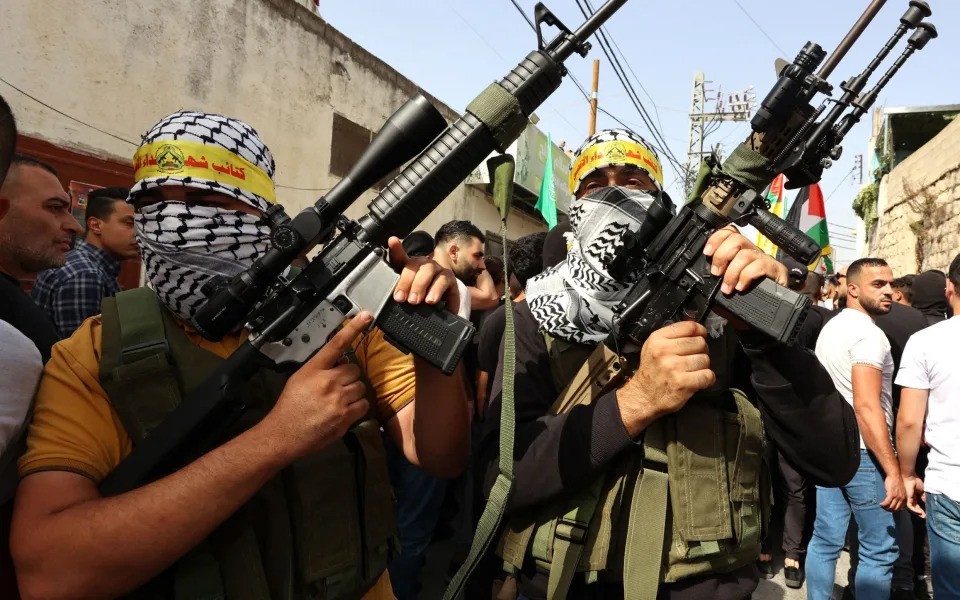
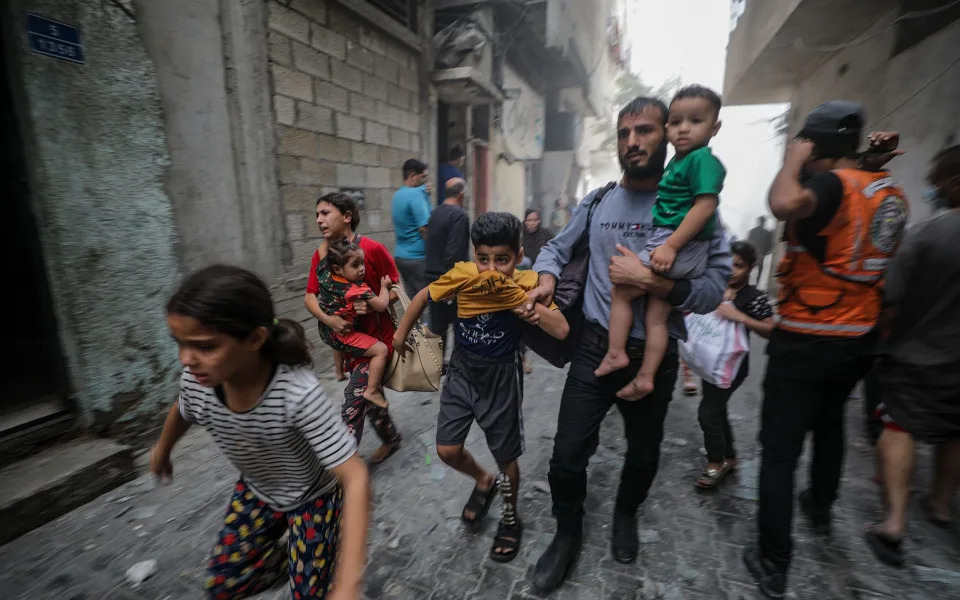
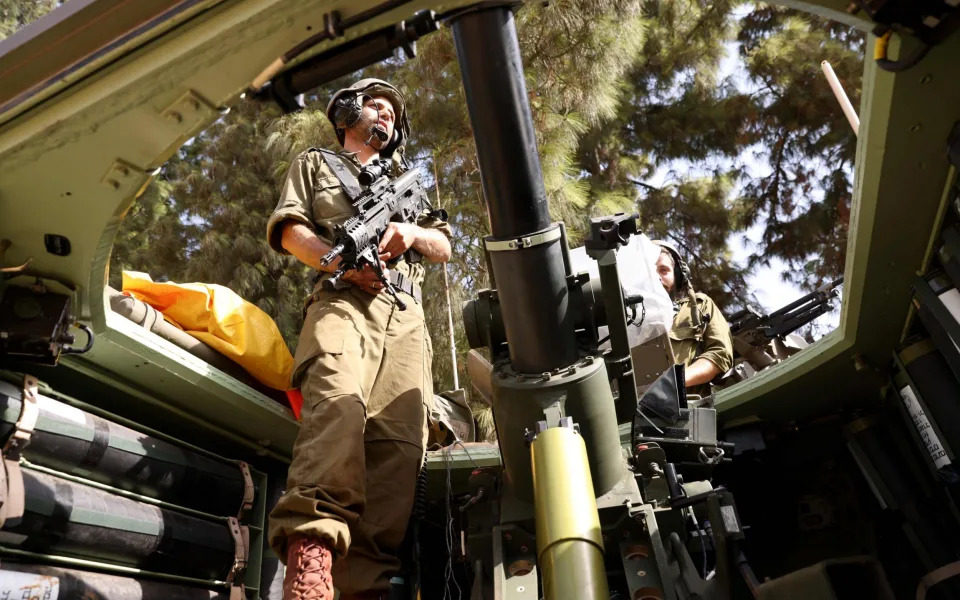
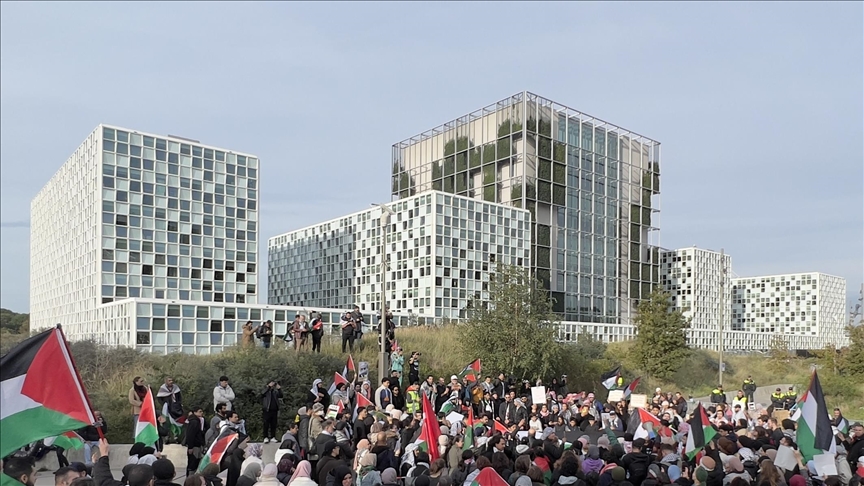
.jpg)
